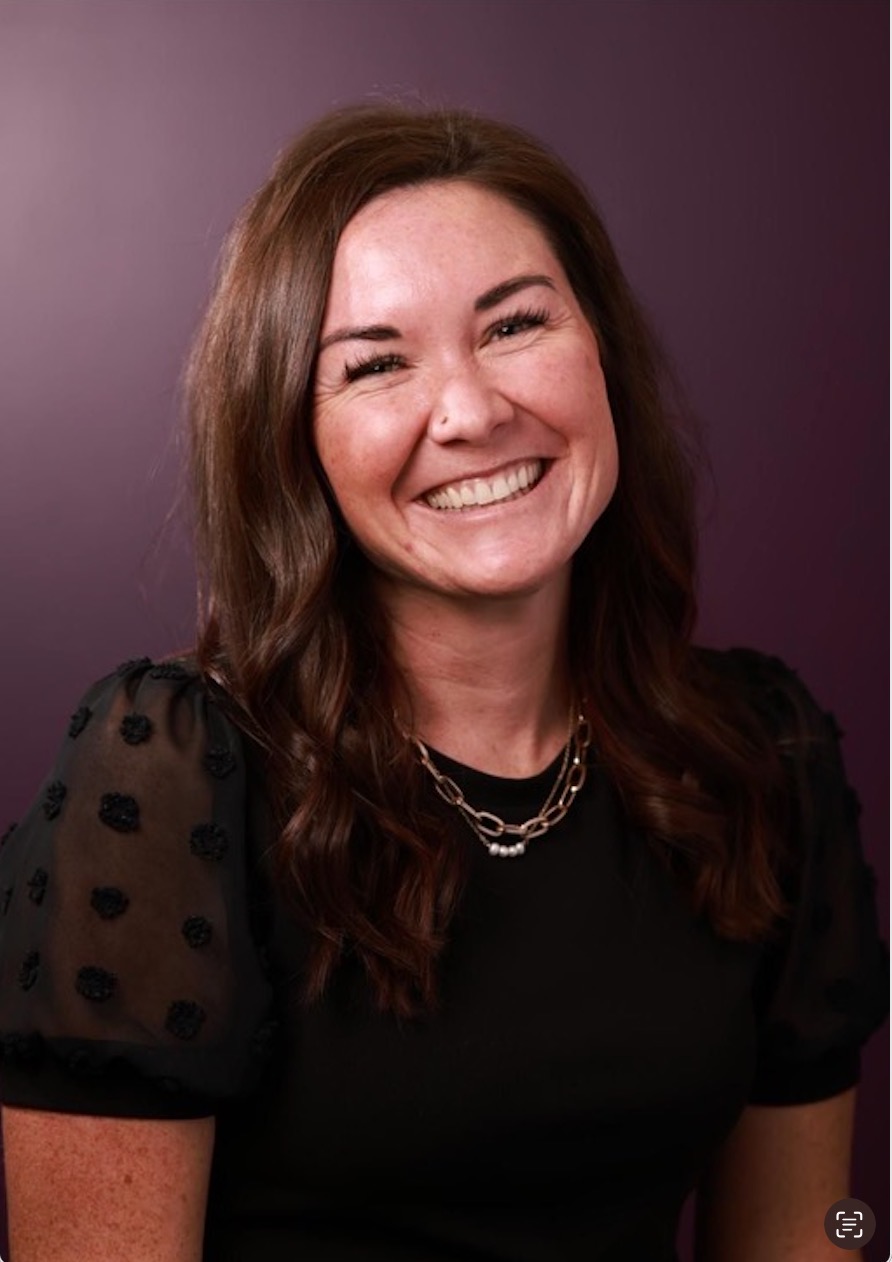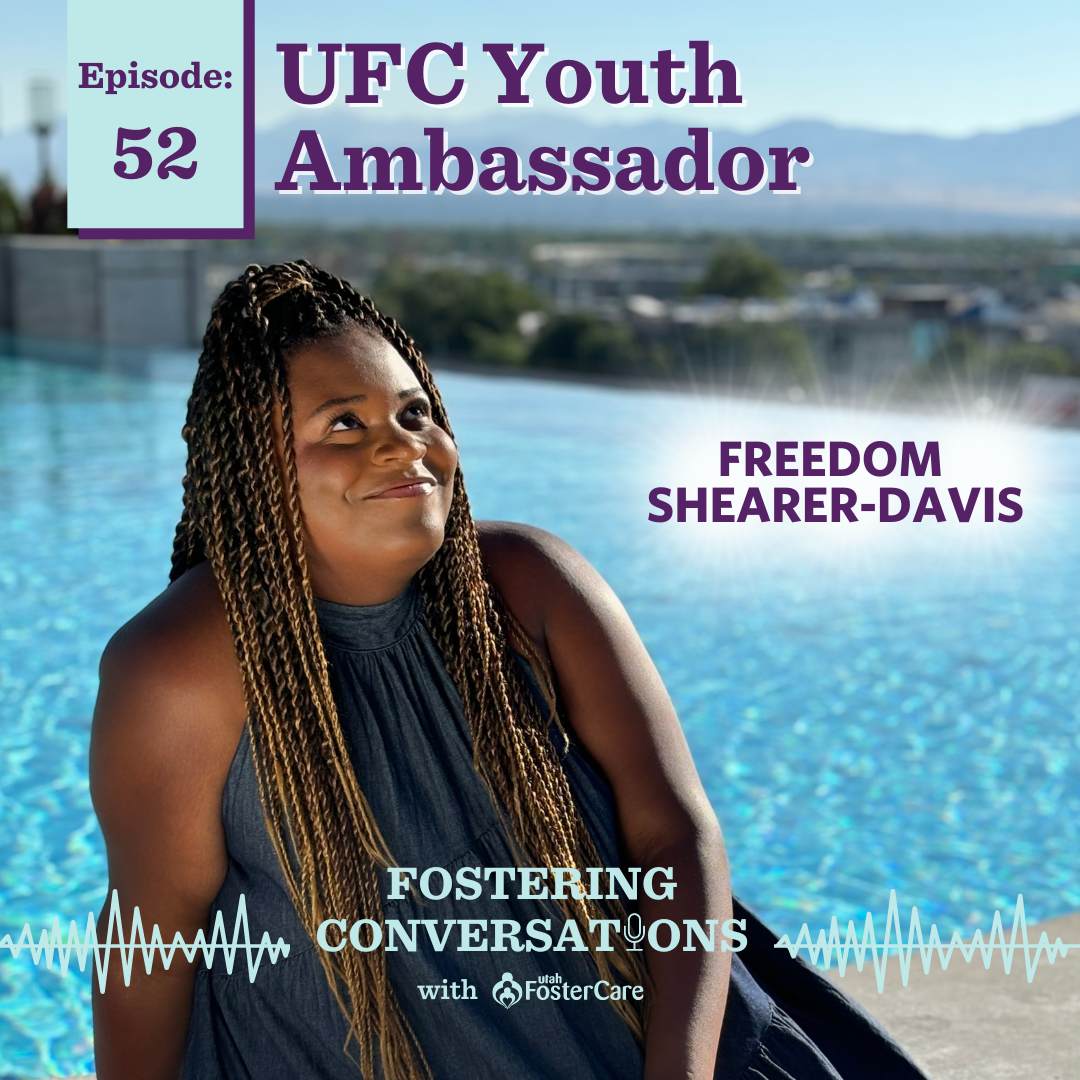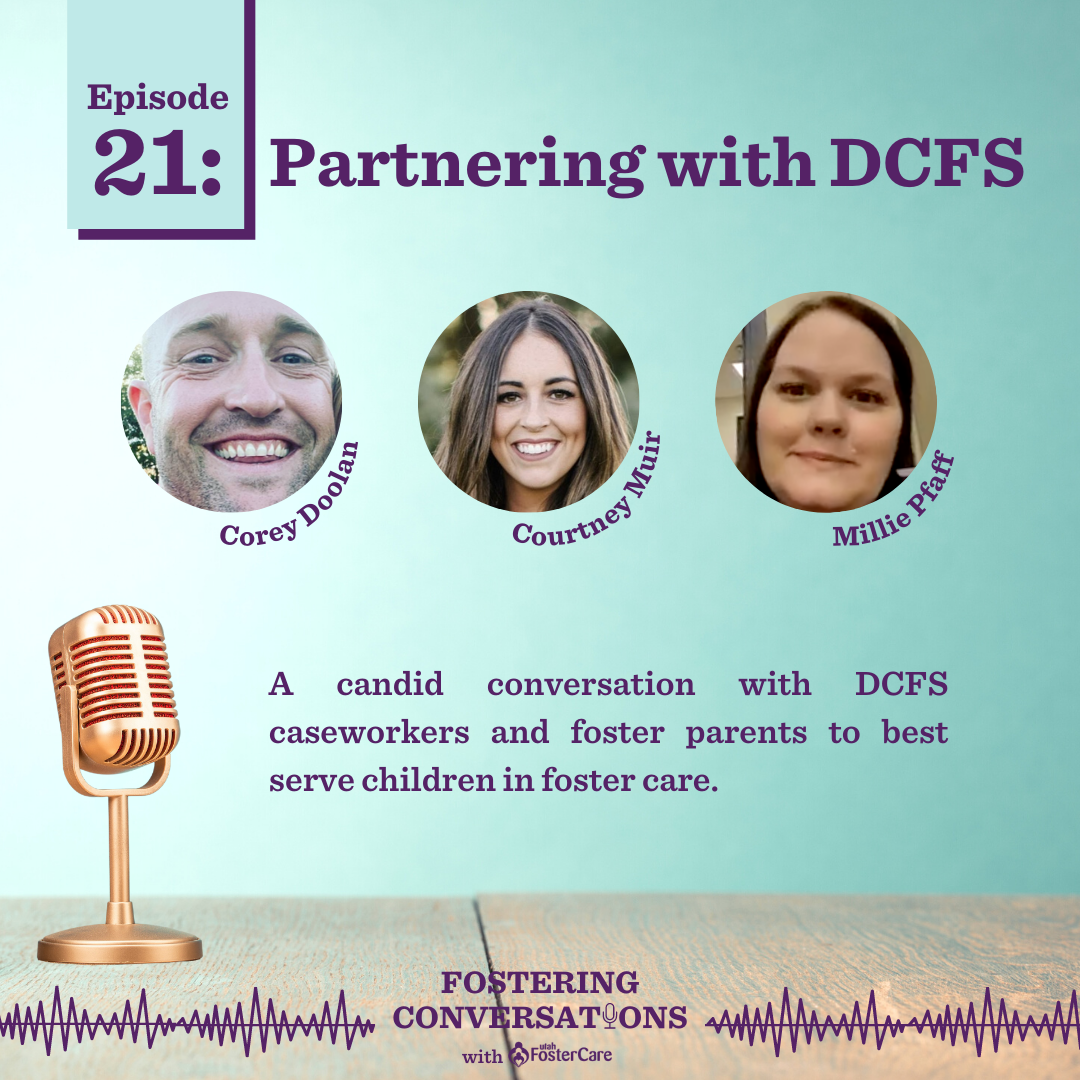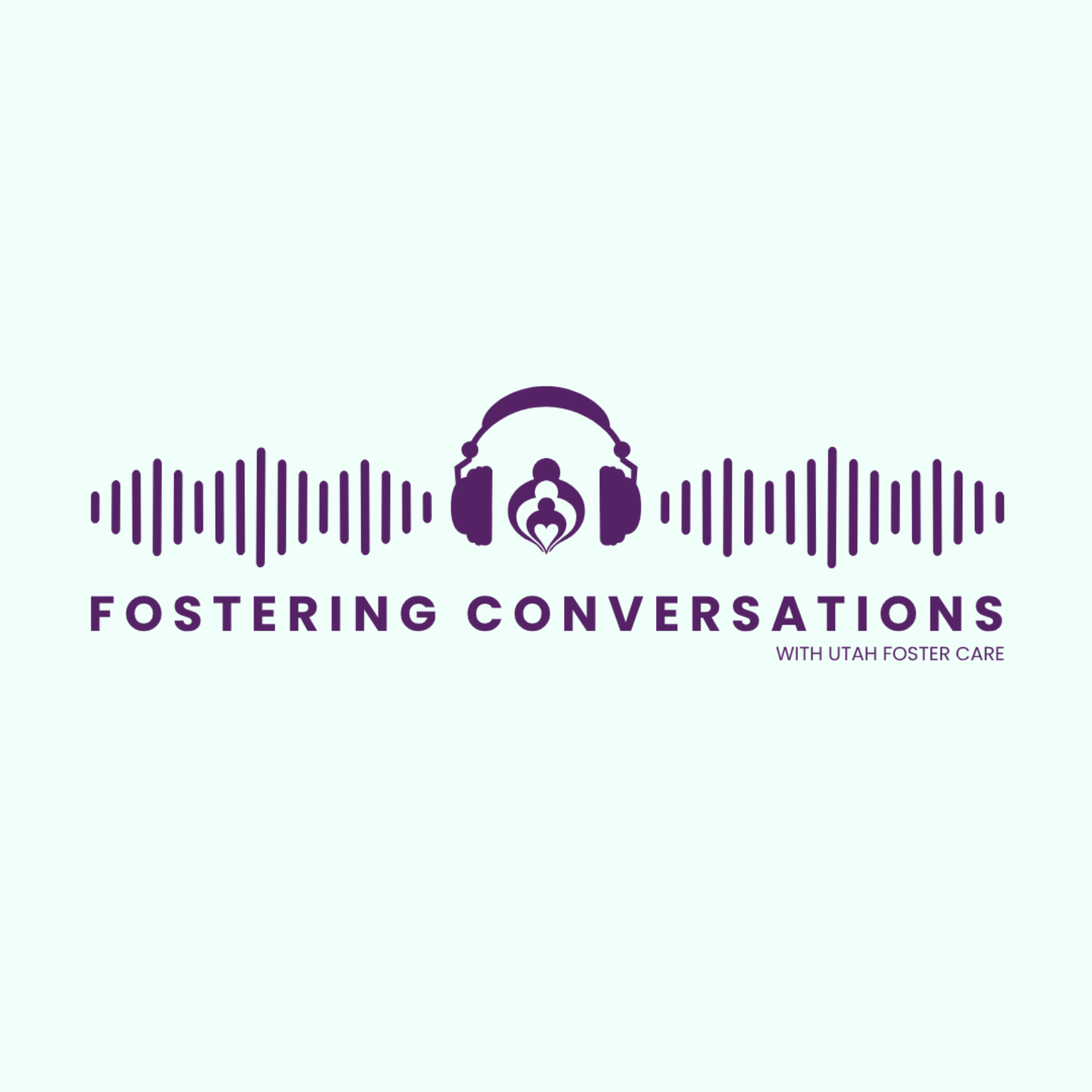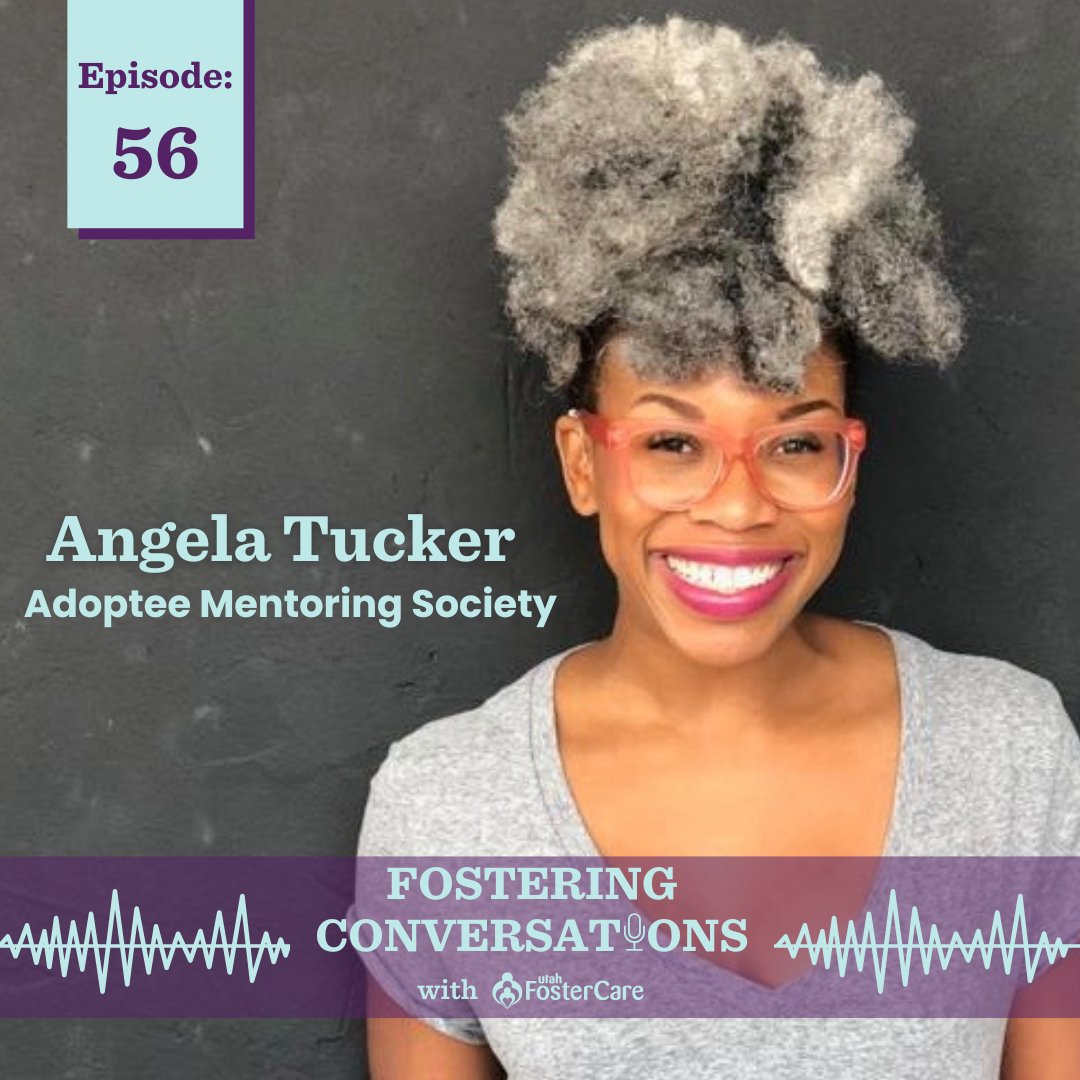Episode Transcript
[00:00:00] Speaker A: Hi, I'm Deborah Lindner. Coming up on fostering conversations, the voice of freedom.
[00:00:05] Speaker B: And I'm Liz Rivera. This is going to be a powerful conversation with one of the voices of foster care.
[00:00:11] Speaker C: This is fostering conversations with Utah foster care, where we have insightful conversations about parenting for bio foster, adoptive, or blended families to better understand the experiences we all face as families.
[00:00:36] Speaker A: We put a little Easter egg into our introduction, didn't we, Liz? We're going to hear the voice of freedom. And freedom is a wonderful person. She's going to be a voice of youth.
[00:00:49] Speaker D: Yeah.
[00:00:49] Speaker B: And I think freedom is a perfect name because she just embodies this sense of liberty and energy and dream. So I can't imagine a better name for freedom than freedom.
[00:01:01] Speaker A: And it is foster Youth voice month. This is when we try to enhance and feature the voices of youth. So let's go ahead and bring freedom into the conversation. Welcome to our podcast, freedom.
[00:01:17] Speaker D: Hi, thank you for having me.
[00:01:20] Speaker A: We decided that instead of introducing you, talking about your background and all, we would let you tell your story in a way you feel comfortable. And you are 15 years old, right?
[00:01:33] Speaker D: I am 15 years old. I'm a sophomore in high school, which is crazy. A lot of people think I'm older than I actually am. So pretty much I was born in Montana and I had an older brother and I don't know how to explain this very well. And then my mom had some addictive problems and with that, me and my brother had to get put into the foster care system. We moved to Utah. I've been placed in many homes before. It's not an amazing experience, but it's a better than not having a home at all. Then at the age of five, I was able to meet my now parents.
[00:02:20] Speaker A: And it's great once you find the right foster parents, it makes all the difference, doesn't it?
[00:02:26] Speaker D: Yeah, it does.
[00:02:27] Speaker B: Can I ask you how much you remember? We don't need details or anything, but just what your memories are of that time. Because you're quite young, you're quite small.
[00:02:36] Speaker D: Yeah, I don't really remember a lot, but I do remember some things.
[00:02:42] Speaker B: Are there things that really stand out for you? Like a particular memory?
[00:02:46] Speaker D: No, not really. Just like fragmentsy pieces here and there.
[00:02:50] Speaker B: Almost like a dream?
[00:02:51] Speaker D: Yeah. Yeah.
[00:02:53] Speaker B: How have you started to make sense of having had this experience that you don't necessarily have memory for, but you know, has still affects you?
[00:03:05] Speaker D: So I'm going to put this in a metaphor. So do you know when you're building a puzzle and then your kids steal some pieces, and then there's just holes in the puzzle.
It's like that. And throughout life, it's like you're trying to find the pieces to put into the puzzle to get the full picture, but sometimes you don't remember everything, so it's like you're putting a piece in the puzzle that doesn't go to the puzzle at all.
[00:03:32] Speaker B: That's a really interesting point. I've never really thought about that. I've heard people talk about the puzzle idea before, but I had never had anyone talk about maybe having a piece that doesn't actually fit. And maybe you start to think something about your story that might actually not be true as you find out more information.
[00:03:49] Speaker D: Yeah, it does happen like that. And then you're like, oh, now I get to try again and learn more about myself. And you can't spend your life finding the missing puzzle pieces. It may be hard, but sometimes you can just paint the puzzle yourself. You can do it if you try really hard.
[00:04:13] Speaker A: You mentioned that you had a brother who was also placed in foster care. Were you placed together, and are you now together, or is he somewhere else?
[00:04:22] Speaker D: We were placed together, but he didn't want to be adopted, so he wasn't adopted with me, so he's somewhere else.
[00:04:29] Speaker A: Okay. You still keep in touch?
[00:04:31] Speaker D: Unfortunately not. I wish we were, though.
[00:04:35] Speaker A: That is one piece of the puzzle that, you know, siblings are. Sometimes we try to avoid it, but they're often separated. That makes it hard. How difficult has it been to fit in with another family?
[00:04:48] Speaker D: Sometimes it's really hard because I'm the only black person in my family, and already growing up in Utah, there's not a lot of diversity. And so lots of the time I don't feel like I belong because I'm different. And it hard sometimes, just like, a piece inside of you doesn't feel like it truly belongs, but, you know, as you belong.
[00:05:11] Speaker B: So it sounds like there's a lot of trying to fit, finding the puzzle pieces that fit and finding the places you fit as well and then fitting in. But maybe other folks don't recognize how well you fit in.
[00:05:24] Speaker D: Yeah.
[00:05:25] Speaker B: And see for who you are. Okay, so then this is like, a really. And any question we ask you, if you don't want to answer it, you say, none of your business. And that's absolutely fine, because this is your story, it's not our story. So when your parents, who we are lucky enough to know they don't look like you, you're going somewhere, your parents are there. Everybody knows, right? Away that these probably are not your biological parents. What do you do with those conversations?
[00:05:49] Speaker D: And it's awkward sometimes. Cause people are like, are these your aunt, your uncle? Are these your family friends? Who are these people? And then I have to explain that they're my parents and they're like, oh, okay. And then the way they phrase it, it feels a little judgmental, you know, like, they feel bad for me, but it's not like a bad thing.
[00:06:14] Speaker B: Uh huh. Yeah. We know your parents, so we don't think it's your parents yet. We think they're both pretty cool.
[00:06:20] Speaker D: They are.
[00:06:21] Speaker B: But it does add to that, that sense maybe, of being different a little bit when it's. You're just very different. And yet. I'm going to make some observations that may or may not be true, but you seem to own it. When you walk into a room, you walk into a room and you are freedom. So how have you come to that? Whether or not things are awkward or sometimes you maybe feel like people don't feel like you belong, how have you still come to that sense of yourself that is so evident when someone sees you? Because seriously, when someone sees you, you are just. You just exude confidence and grace and beauty. How did you come to that?
[00:06:57] Speaker D: To be actually very truthful with you guys, I don't feel confident a lot of the time, even when I'm around people. I like showing people how I want to be seen and not how I actually feel. And it's easier to show how I want to be seen. And so I'm glad that lots of people think I am confident, but I'm not as confident as I actually am.
[00:07:22] Speaker B: Okay, so, because you do, I would never have suspected that you didn't feel as confident as you appear.
Do you ever feel like. And I think what you're doing is great. I just. What I worry about is, do you ever feel like people don't necessarily see the real you if there's a part of you that is maybe insecure and maybe doesn't feel like you belong? If everybody thinks that you are so confident and so they don't really. I'm not quite sure I'm trying to say this, but they don't really necessarily recognize what you really need because they just assume you're fine.
[00:07:53] Speaker D: Yeah. With everyone assuming I'm fine, sorry, I'm getting over sickness, as my dad told you before, but with everyone, like, assuming I'm fine and not asking questions yet, I didn't tell people that I'm not okay. I don't like people not knowing I'm not okay, but with being, quote unquote confident and showing people how I want to be seen. Yes, it's hard for people not to know how I actually am, but I'd rather people see me as I'd want to be seen than actually people just feeling bad for me, being like, oh, are you okay? Because sometimes I feel like there's something wrong with me if I'm not okay, but I know that's not true. And trying to get over that, I.
[00:08:43] Speaker B: Think a lot of people. That's hard for a lot of people. So who in your life, and I'm hoping it's your mom and dad, are part of them, but who in your life do you feel so safe with? You can say, I just am having.
[00:08:53] Speaker D: A bad day right now. There's not really anyone because I hate talking about my feelings. I don't talk to anyone about anything ever.
I'm trying to get over that, you know, trying to build to that confidence that I show everyone that I don't actually have right now. I want to have that in the future.
[00:09:15] Speaker B: Okay. Yeah.
[00:09:17] Speaker A: We've seen you do a lot of things. Utah foster care does have some resources that you participated in. Has there been anything that's really touched your heart? Like thinking, oh, maybe this is something I could go on and do in the future? Like, we have the boss bus. That talk about different jobs and careers. Tell us a little bit and how that sort of maybe help you get in touch with who you are for.
[00:09:53] Speaker D: Things like the boss bus, as you mentioned. I feel like that has really helped shape me as a person because when I was doing it, when I was in the film class, I wasn't actually participating in what everyone was doing, but I could actually watch and film people. I could see that there were people who were there who was, like, actually really interested and what they were learning, and they were super excited to know all of that stuff. And I feel like if more people had that opportunity, then more people could have the option to show that just because you're in foster care doesn't mean it limits you to not being able to do the things that you want to do.
[00:10:40] Speaker B: And I love, too, that you talked about, you're watching them. You been in foster care, but you're also in this kind of privileged position where you're filming it. So you're watching what can happen to somebody when they have these experiences. It's really cool.
[00:10:53] Speaker A: I think that is part of what we see in your confidence that you just described that there's a future. What are some of the hopes you now have for your future?
[00:11:04] Speaker D: For me in the position that I am in right now, I really hope to inspire people to help people in foster care, not just donating money, but help them feel seen and understood and not alone and not like they're forcing pieces of the puzzle to be together and that the puzzle piece actually goes in the right place.
[00:11:31] Speaker B: That's a great analogy. You said the position you're in. So you talked to Nikki McKay, who's the CEO of Utah Foster care a few months ago, and you're going to be a representative of the youth in foster care. And so as we continue to lift up youth voices and youth lived experience, you're going to be one of these people who do that and share yourself to some degree with Utah to let them see what's possible. And because not every kid in foster care can get represented, you're going to help represent them.
[00:12:03] Speaker D: Yeah.
[00:12:04] Speaker B: Which is so cool.
[00:12:05] Speaker A: Let's go over just a couple facts for people listening and are curious about teens in foster care. In Utah, more than half of the kids in foster care are teens. And yet people coming into the foster parent experience usually want young kids. But what would you tell foster and adoptive parents about bringing a teen into your home? What are some things they really need to understand that you need?
[00:12:36] Speaker D: In my personal experience, I feel like they need to understand that not only does foster care impact their lives and the trauma that comes from foster care impact their life, but just living in society today as any age really impacts too. And I know that lots of parents are looking for younger children, but when you're like a teenager, you can still have the same problem as, let's say like an eight year old as you are a teenager because you never got the help you needed when you were younger. And so when you're a teenager, you just need that support because if you don't have that support, you can just feel really alone, like you're floating and you're sinking and you have no one to save you from sinking. And it's hard.
[00:13:29] Speaker B: And it sounds like part of the reason why you want to be a voice of foster care is to almost be a life preserver for those kids who feel like they're sinking, that they don't have to be alone, they can't accept help.
[00:13:42] Speaker D: Yeah.
[00:13:43] Speaker A: And unfortunately there are, and this is a nationwide trend of kids that exit foster care without a supportive family often go through homelessness, incarceration. So there's a good reason why you need someone really every 15 year old should have supportive parents helping them get through life and learn about adulting, as we call it. And that's not something to be ashamed of. All teens need it. All people need it. And a lot of teens and maybe 20 somethings, once they leave foster care, they want nothing to do with the system, even though there's lots of resources, some of which you've accessed. What would you tell them if there's a teen in foster care and you're like, I don't want to have anything more to do with special programs. None of this stuff. How would you encourage them?
[00:14:44] Speaker D: I would say that it's understandable that they don't want help, because sometimes it's hard to ask for help. And even though they know deep down that they need help, they just can't ask for help because it's too hard. You know, like the saying where you can give horse water, but you can't force it to drink.
Sometimes you need to just keep giving the horse water, because eventually we'll have to. Because I feel like if they don't get help, then, like you said, they will become homeless. They'll have more problems than they had before if they go and age out of the system.
And everybody, even if you're not in the system, everybody needs help in some point in their lives.
[00:15:35] Speaker B: Absolutely. And it takes, going back to that word, confidence we talked about, it takes some confidence to ask for help, confidence that you're worthy of help, confident that someone will help you, that they can help you and will help you. So asking for help is actually a very brave and confident thing to do. Yeah, I love that. So I want to talk a little bit about the clarinet. You play the clarinet? Why do you play the clarinet? I love the clarinet, by the way, because I think it's like, it has that soulful sound to it, and I just think it's wonderful. So how did you pick the clarinet?
[00:16:08] Speaker D: So I'm like, I want to join more to band, but I don't know what instrument to play. And my friend's like, were you gonna need to know how to play an instrument if you wanna join more GBA? And I'm like, what instrument do I play? And then I remembered that my older brother, he played the clarinet. And so I'm like, maybe I'll play the clarinet, too. And so I asked to borrow his clarinet, and then I learned how to play the clarinet off of YouTube in one month.
[00:16:34] Speaker B: Wow.
[00:16:34] Speaker A: Oh, my goodness.
[00:16:35] Speaker B: That's impressive. Very cool. Very cool.
[00:16:38] Speaker A: It took me years to learn how to blow into a flute, and I've never even tried.
[00:16:45] Speaker B: Wow, that's fantastic. So now that you're in marching band, is it all that you hoped it would be?
[00:16:51] Speaker D: Yeah, it's all I hoped it would be, but it's a lot more mental energy than I thought it would take. Not only it's physically exhausting, but it's also mentally exhausting. So after school and everything, it's really hard to go into marching band and spend more mental energy on that.
[00:17:11] Speaker B: Yeah, I never thought about that.
[00:17:13] Speaker A: And you are really working your brain, too. And so you're going to get the benefits later from learning all this music and everything.
[00:17:21] Speaker B: It's like a second language.
[00:17:23] Speaker A: Yeah. Yeah. Has that become like a little community you've built for yourself as a 15 year old?
[00:17:30] Speaker D: Yeah, I really like the marching band community. Everyone's super nice. You can talk about anything and someone will know what you're talking about. My friends are also in marching band, and then I became friends with their friends. It's just. They're just so welcoming, and it's just nice to be there.
[00:17:50] Speaker B: That's fantastic. And is there like a marching band season? Is it just during football season or is it a year round thing? Do you guys do?
[00:17:58] Speaker D: It's mostly during football season. It's not all year, but they also have a summer program. I did the summer program this year. I'm probably not going to do it next year, but.
[00:18:10] Speaker B: Too hot.
[00:18:11] Speaker D: Yeah, it is a lot.
[00:18:13] Speaker B: Do you like football?
[00:18:15] Speaker D: I can't say it because I don't understand football at all. I'm like, so the guy kicked the ball a lot of touchdown. Why are you kicking the ball again?
[00:18:26] Speaker B: This is football. Why is there so much skiing?
[00:18:28] Speaker D: Yeah.
[00:18:28] Speaker B: This is not soccer. That's funny. But you're going to the games and you sit in the stands, don't you? Is the marching band.
[00:18:35] Speaker D: Yeah. So they have this thing called pet band. And most of people in marching band go, but people who are also in band classes can go. And you play music during the breaks between each quarter. We play a little bit of. And we have 35 songs we choose from. We don't go onto the field, though. We just. Okay. In the stands?
[00:18:57] Speaker B: Yeah. Cool. That sounds like fun.
[00:18:59] Speaker A: It is a lot of work, but I think you'll be glad you did it.
[00:19:03] Speaker B: You may learn more about football as you go.
[00:19:06] Speaker A: Hopefully secondary.
[00:19:09] Speaker B: Yeah, that's right. Music first. Okay, next, let's talk about your modeling career.
We will post show notes for all the podcasts. So we'll have your dad post a link to Impact magazine. Tell us about that photo shoot. Cause when people are gonna see this picture, and just like you said, people think you're older than 15, and this picture. Really? Yeah. So tell us about that day.
[00:19:29] Speaker D: I don't even know what day it was. It was, like, weeks ago, and so it was after school, and I'm excited. I'm getting ready, and we go to the hotel we're going to be at, and we have to find our way to get up there. And we eventually get to the roof, and the pool is gorgeous. I'm like, I wish I could swim in that. And Tanisha got someone to do my makeup for me. And so while the adults conversed, I got my makeup done, and I'm super excited. I'm, like, pumped to go get my picture taken.
And so we get all ready, we go outside, and it's hot out there. It's, like, extremely on the top of a roof, hot outside.
I'm like, oh, my gosh. So I'm, like, burning out there. And they're like, okay, so we're gonna try you standing here first. And so I stand on, like, the edge of the pool, and I'm trying not to fall into the pool. I don't end up falling into the pool. So that's. And they hold up like it's like the sheet, and it has tin foil on it, and it's shining the sun.
[00:20:41] Speaker B: In my eyes, so even hotter.
[00:20:44] Speaker D: And so I'm trying to lightly smile while showing teeth and trying not to, like, pinch my eyes closed from the sun in my face and try to fall in the pool. Yeah, right? We got, like, a really good photo, but it was a really good photo, and I still managed to do a soft smile and not have my eyes completely closed and look good at the same time, so.
[00:21:12] Speaker B: Yeah, yeah, it's fantastic.
[00:21:14] Speaker D: It really is.
[00:21:15] Speaker B: And I think, once again, it captures that essence of you. I think your personality really shines through that, too.
[00:21:21] Speaker D: Thanks.
[00:21:22] Speaker A: And the magazine is impact magazine. I understand impact. It's a magazine that empowers african american women. And where can people see this?
[00:21:34] Speaker D: It's an online issue, so if you just go to September of 2024, it should be there.
[00:21:41] Speaker A: We're getting to the end of our podcast. Is there anything freedom that you thought about that you really want other people considering doing foster care or the kids out there that are your age? Any other message you want to convey?
[00:21:59] Speaker D: I would like to say that even though it's hard and it takes confidence and sometimes strength, you do need to ask people for help every once in a while. Even though it's extremely hard for some people. It's hard for me sometimes, too.
Not sometimes, all the time, but being honest and that everyone deserves someone. Because you can't just be floating alone all the time. Because then life's sad and you don't want life to be sad.
You gotta get through the hard times so then the happy times can be better.
[00:22:44] Speaker A: It sounds like you're talking about trust.
Gotta learn to trust.
[00:22:49] Speaker D: Yeah.
[00:22:50] Speaker A: Or maybe it's hard to do it.
[00:22:52] Speaker D: Yeah, it is hard to trust people sometimes, especially when you are in foster care and you're constantly moving around and you just want to stay in one place. Because change is difficult, moving is hard.
[00:23:07] Speaker B: So you told your parents you could live with them the rest of your life?
[00:23:11] Speaker D: Maybe?
[00:23:12] Speaker B: Nope.
[00:23:13] Speaker A: I think one thing I've learned from conversations with you, but also other kids in foster care that are your age, is that it's not what you've been through in life, but it's how you adapt to it and what you're willing to do to get through it that really makes you the person you are today.
[00:23:34] Speaker B: Make something good out of the hard things. Hard things don't go away, but we can transform them.
[00:23:39] Speaker D: Yeah.
[00:23:40] Speaker A: Thank you, freedom. We're gonna be watching you to see how you keep blossoming, because you really are like a flower that has blossomed and you've got a long way to go. So thanks again.
[00:23:55] Speaker D: Thank you for having me.
[00:23:57] Speaker B: And you're only 15. Oh, my gosh. I can't even imagine. You have the whole world in front of you. Just amazing.
[00:24:04] Speaker A: All right, thanks to everybody responsible on this podcast, including our producer Marshall, my co host, Liz Rivera. And like I always say, remember, you don't have to know everything to be a good foster parent. You just need to be willing to learn.
For details on foster parenting and so many other ways you can get involved, go to utahfostercare.org. dot. This has been fostering conversations I'm Deborah Lindner.
[00:24:35] Speaker C: This has been fostering conversations with Utah foster care. Thank you for joining us. For more information, go to utahfostercare.org. we'll see you next time.
